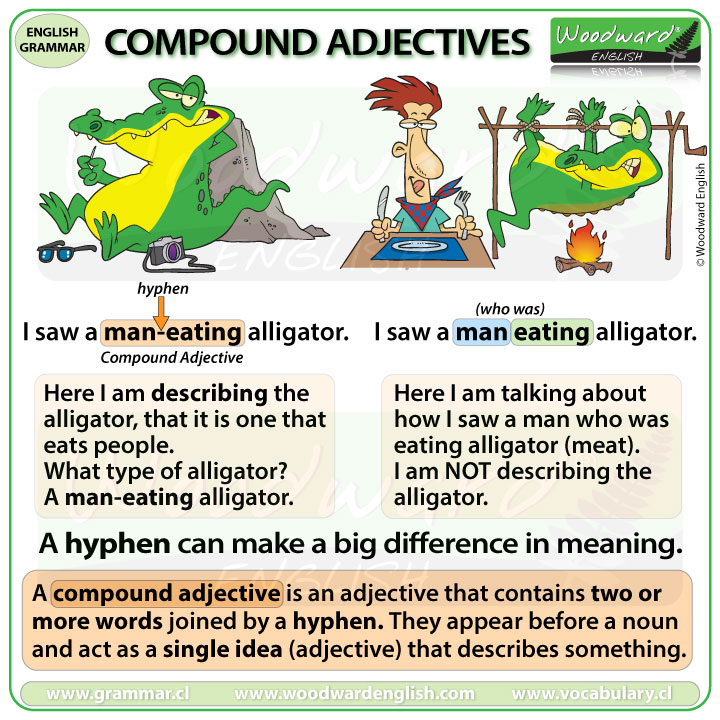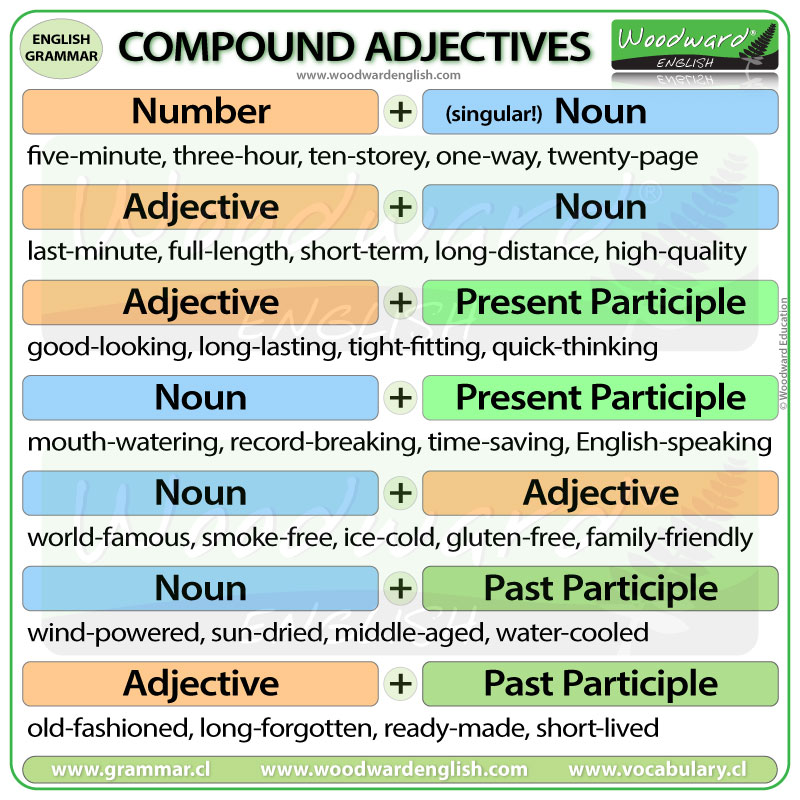Compound Adjectives in English
Let’s look at the following sentences:
- I saw a man-eating alligator.
- I saw a man eating alligator.
What is the difference between these two sentences?
The first sentence has a hyphen (-) which is a little dash between the two words man and eating and the second sentence doesn’t.
Is there a difference in meaning?
YES! There is a big difference. Let’s use some cartoons to show this.

The first sentence contains a compound adjective… man-eating
A compound adjective is an adjective that contains two or more words joined by a hyphen.
In this case we are joining the words MAN and EATING to create the compound adjective.
This compound adjective describes the alligator as one that eats men or people in general.
Is it a banana-eating alligator? No. It it a hamburger-eating alligator? No. It is a man-eating alligator.
Compound adjectives appear before a noun and act as a single idea (a single adjective) that describes something.
The second sentence doesn’t have a compound adjective. There is no hyphen between the word man and eating. Why?
Because we are talking about how we saw a man who was eating an alligator. We are not describing the alligator.
So quickly looking at both sentences again:
The first sentence:
- I saw a man-eating alligator.
We are describing the alligator. What type of alligator is it? It is one that eats men (or people).
The second sentence:
- I saw a man eating alligator.
I am talking about a man who is eating an alligator.
As you can see, the hyphen (or lack of a hyphen) makes a big difference in the meaning of the sentence.
Let’s learn more about compound adjectives.
Compound adjectives
As we have seen, a compound adjective is an adjective that contains two or more words joined by a hyphen.
- I live in an English-speaking country.
English-speaking is a compound adjective used to describe the country.
We use a hyphen to connect the word English with speaking to show that it is one adjective or one idea.
What type of country is it?
It is an English-speaking country.
Look at this sentence:
- She is a world-famous singer.
She is not just a famous singer in her country. She is also famous around the world so she is a world-famous singer.
In general, we do not use a hyphen between two adjectives.
- She has a big blue book.
Big and Blue are adjectives so we do not put a hyphen between these two adjectives
This includes when one of the adjectives is already a compound adjective. Look at the following:
- He lives in an old coal-mining town
Coal-mining is a compound adjective that consists of coal and mining.
What type of town is it? A coal-mining town… a town where they mine coal.
But we have also included the adjective OLD because it is an old town.
We didn’t put a hyphen between the word old and coal because coal is part of the compound adjective coal-mining.
In general we don’t put a hyphen between two adjectives, including if one of those is a compound adjective.
So how can we make compound adjectives?
Which parts of speech can be a part of compound adjectives?
Here is a list of the most common types of compound adjectives:
Periods of Time
One very common use of compound adjectives is with periods of time.
The compound adjective is made with a number + a period of time.
Some examples include: five-minute, three-hour, ten-day, six-month, twenty-year.
It is important to note that the period of time needs to be in singular form. five-minute NOT five-minutes
Let’s look at the first example.
- I work an eight-hour day.
We do NOT put an S at the end of hour. We cannot say “I work an eight-hours day.” This is NOT correct. The time period needs to be in its singular form.
- I work an eight-hour day.
This means that I work eight hours every day. There is an S at the end of hours in the sentence on the right because it is not a compound adjective that goes before a noun.
Look at these other examples:
- I had a three-week vacation. = I went on vacation for three weeks.
- There was a five-second delay. = There was a delay of 5 seconds.
Notice how we normally write the number as a word, not in numerical form, unless it is a very large number.
And remember it is important NOT to add an S at the end of the compound adjective.
I had a three-week vacation NOT three-weeks vacation.
Number + Singular Noun
When we have a number before a noun in a compound adjective, that noun is always in singular form. This not only applies to periods of time as we have already seen but with other nouns too.
Some examples of compound adjectives that are made from a number + singular noun include: five-minute, three-hour, ten-storey, one-way, twenty-page
Our example sentences:
- I had to print a ten-page document.
- You need to go down that one-way street.
- We live in a two-storey house.
NOTE: We we are talking about the level of a building:
Storey (with an E) is used in British English.
Story (without an E) is used in American English.
So in American English it would be written as:
- We live in a two-story house. (American English)
Adjective + Noun
Some examples of compound adjectives that are made from an adjective + noun include:
last-minute, full-length, short-term, long-distance, high-quality
Our example sentences:
- I made a last-minute decision to stay home.
- Most of their staff are on short-term contracts.
- We create high-quality resources.
Adjective + Present Participle
Some examples of compound adjectives that are made from an adjective + present participle include: good-looking, long-lasting, easy-going, tight-fitting, quick-thinking
Our example sentences:
- It left a long-lasting taste in my mouth.
- She wore a pair of tight-fitting jeans.
- The quick-thinking staff got everyone to safety.
Noun + Present Participle
Some examples of compound adjectives that are made from a noun + present participle include: mouth-watering, record-breaking, time-saving, English-speaking
Our example sentences:
- I bought some mouth-watering strawberries.
- That was a record-breaking jump.
- I used to live in a Spanish-speaking country.
Noun + Adjective
Some examples of compound adjectives that are made from a noun + adjective include:
world-famous, smoke-free, ice-cold, gluten-free, family-friendly
Our example sentences:
- We often go to the family-friendly restaurant near our house.
- There is nothing better than an ice-cold drink on a hot day.
- Could you buy me some gluten-free cookies please?
Noun + Past Participle
Some examples of compound adjectives that are made from a noun + past participle include: wind-powered, sun-dried, middle-aged, water-cooled
Our example sentences:
- We should start using wind-powered generators to cut costs.
- I added some sun-dried tomatoes to the platter.
- My new water-cooled gaming PC is quieter than my old one.
Adjective + Past Participle
Some examples of compound adjectives that are made from an adjective + past participle include: old-fashioned, long-forgotten, ready-made, short-lived
Our example sentences:
- I found a long-forgotten painting in the attic.
- He doesn’t like to cook so he buys ready-made meals.
- They had a short-lived romance.
Compound Adjectives English Summary Chart

